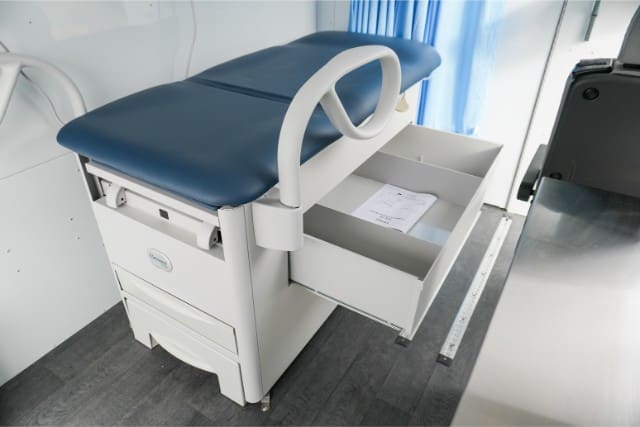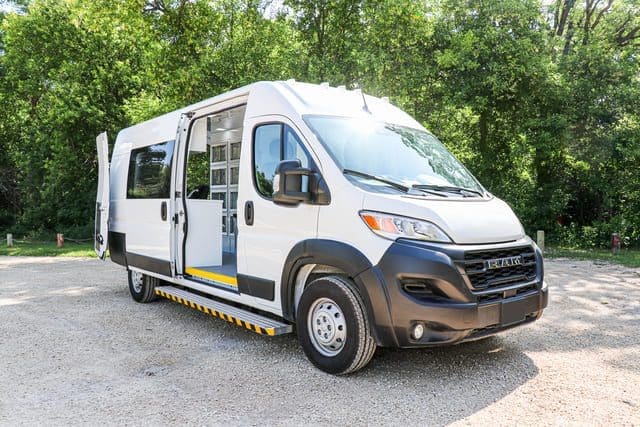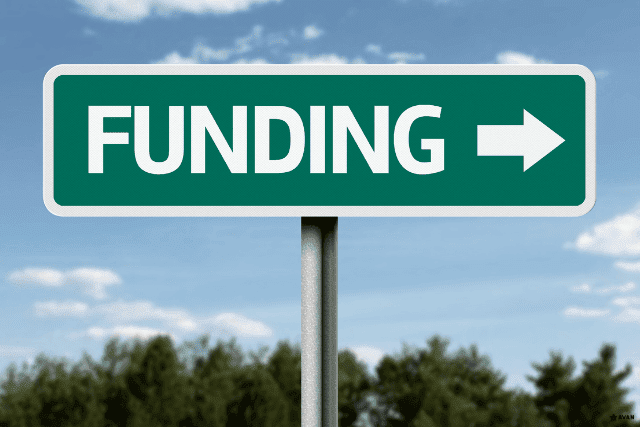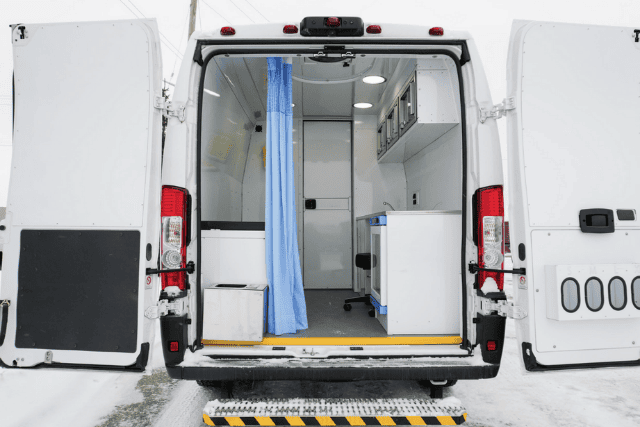If there are no mobile clinics, some people in the U.S. have to wait longer to deal with health issues. This is a big problem, especially for those without money or transportation, as well as those with mobility issues. When healthcare takes too long to get, sickness can get worse. Sadly, this is just one of the many issues that life without mobile clinics can cause.
Our team at AVAN Mobility works hard to manufacture mobile clinics to address healthcare barriers just like the one we talked about. We’ve made hundreds of these vehicles so organizations like yours can reach out to people who need healthcare the most.
If your organization is looking into mobile clinics to understand how they improve healthcare, you’re in the right place. By the end of reading this article, you’ll know a whole lot more about these innovative vehicles.
What are mobile clinics?

A mobile clinic acts like a traveling health station, resembling a doctor’s office on wheels. It’s a specialized vehicle that goes to different places to make healthcare services closer to communities. Instead of people going to a hospital or clinic, the mobile clinic comes directly to their neighborhood.
Inside the mobile clinic, there’s a small space for check-ups and basic treatments. Mobile clinics are staffed by a team of friendly healthcare professionals. These clinics are like movable medical offices in places where it’s hard for people to get to a regular healthcare center.
Who benefits from mobile clinics?
Mobile clinics benefit a wide range of people. They’re especially helpful for those facing challenges in accessing regular healthcare facilities. Whether someone lives far away, has difficulty moving around, or just needs a quick check-up, the mobile clinic is there to help.
7 ways mobile clinics improve the healthcare industry
Mobile clinics transform healthcare by directly reaching communities, addressing health challenges and healthcare barriers, and improving accessibility. In this section, we’ll explore how these clinics reshape healthcare for the better.
1. Reducing hospital wait times
Mobile clinics bring healthcare to neighborhoods so patients don’t have to go far to get help. They set up in ideal locations, giving check-ups and advice without the long waits you might find in hospitals.
What’s the impact?
- Patients receive quick access to healthcare without visiting crowded hospitals
- Emergency rooms prioritize critical cases, reducing congestion
- Hospitals prioritize emergencies, improving overall efficiency
- Individuals save time and resources since they don’t have to drive
2. Promoting preventive care
Mobile clinics shift healthcare from reactive to preventive. You can equip a mobile clinic with preventive care services and offer things like vaccinations, screenings, and health education. Regular community visits encourage ongoing health monitoring, preventing the progression of diseases. Early intervention prevents the progression of some diseases.
What’s the impact?
- Communities gain improved awareness of health issues
- Early intervention reduces the overall burden on the healthcare system
- Preventive measures contribute to a healthier population
3. Addressing Healthcare Disparities
Mobile clinics help people in parts of the U.S. where healthcare is hard to get. They make sure everyone gets important medical care by going to places that need it most and working with local groups.
What’s the impact?
- Increased trust and engagement with healthcare services in marginalized communities
- Reduced healthcare disparities between urban and rural areas.
- Improved health outcomes in underserved populations
4. Cost-effective healthcare delivery
Mobile clinics are a cheaper way to provide healthcare than the usual methods, such as standard hospitals. They have a simple setup and concentrate on stopping problems before they get serious. This is an efficient way to use resources wisely.
What’s the impact?
- Mobile clinics are much smaller than full hospitals, making them less expensive to run
- Preventive services reduce long-term financial burdens
- Outreach programs minimize the need for expensive emergency care
- Cost savings for healthcare providers and patients
- Efficient resource use ensures broader coverage
- Improved financial sustainability for healthcare organizations
5. Rapid response to public health emergencies

Mobile clinics play a crucial role in responding swiftly to public health emergencies. Through a mobile clinic, you can offer rapid testing, vaccination drives, and immediate healthcare interventions. In times of crisis, these clinics can be mobilized to provide on-the-spot medical assistance. This ensures a quick and efficient response to community health needs.
What’s the impact?
- Improved community resilience during public health emergencies
- Timely containment and management of health crises
- Mobile clinics act as frontline responders, reducing the strain on hospitals
6. Using data to improve healthcare
Mobile clinics also gather information about community health. They gather and study this data during visits to help healthcare organizations make wiser choices. This data also helps them use resources wisely and offer services that match each community’s needs.
What’s the impact?
- Data helps healthcare organizations understand what each community needs
- Wise decisions lead to better healthcare services
- Tailored approaches address specific health challenges in communities
7. Mental health support
Mental health is just as important as physical health. Some mobile clinics give services like counseling and support.
What’s the impact?
- Making mental health better for individuals
- Making fewer people feel embarrassed about mental health
- Spreading the news about the importance of mental health
A real-life example of how mobile clinics are improving the healthcare industry
Stephanie Brady, who started the Community Clinic of Southwest Missouri 30 years ago, wanted to help folks without easy access to healthcare. They began in a church and grew over time with caring doctors, nurses, and volunteers.
In 2011, a tornado hit, and the clinic provided immediate care. Although experts thought the community would lose 25%, it only lost 2%. The clinic focused on rebuilding better and supporting those with lower incomes.
Going mobile: a lifeline for rural areas
Four years ago, the organization dreamed of a mobile clinic. This year, a partnership with AVAN Mobility made it happen. With the mobile clinic, they’re now able to reach rural areas with primary care and vaccines.
The new mobile clinic brings healthcare directly to people and removes barriers like transportation and distance. Stephanie sees expanded services and more people getting the care they need.
Your next steps with AVAN Mobility
You landed on this article while looking for more information on how mobile clinics are improving the healthcare industry.
If you made it this far, you now know about 7 more ways that mobile clinics have been making positive changes in the industry.
Your organization can also make a big difference with a mobile clinic. Reach out, and let’s transform healthcare together. Check our articles on starting a mobile medical clinic and applying for grants to help make the process much easier.




